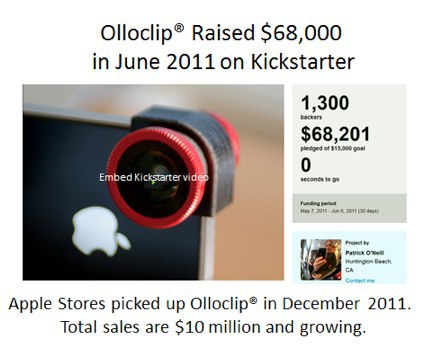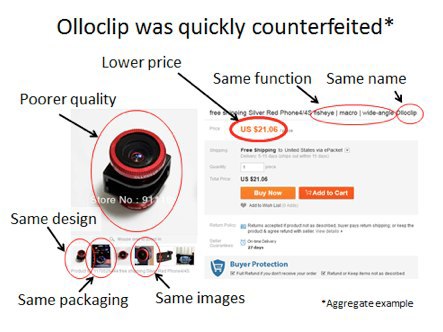Private detective, patents and illegal imports - a little about the fight against startups with fakes

[from translator] Habré had a curious article about Kickstarter, innovations and frustrations - despite innovation and fresh ideas, many start-ups suffer from the "childhood illnesses" of young business and the inability to put things on stream. But the failure of plans does not always occur due to the lack of business savvy - often fraudsters who have mastered CTRL + C come into the picture. I propose to look at the situation from a startup and see how patents help them stay afloat. Of course, in addition to patent trolling competitors.
This is a continuation of a series of articles in which we talk about patents and copyrights as tools for protecting our own developments. In the previous series, the issues of protection of the shape and design of the product ( The Power of the Broken Line ), safety of graphic elements ( The Power of Color ), protection of developments with the help of the portfolio ( The Power of Portfolio ) have already been considered. Now let's see how you can use trademarks and patents to counter fakes.
')
One small company
Let's first understand what “patent protection” means and how it can be used in a difficult struggle with clones. Usually this is an active search for those wishing to cash in on your success, followed by muscle flexing with a statement of their rights. Of course, patents and trademarks alone do not insure against the appearance of fakes - if the product is successful, it will almost certainly be copied by someone enterprising. But as soon as it happened - we have our hands free in the struggle for property.
The article does not just talk about patents and trademark rights. The fact is that a trademark is the very first line of defense in online distribution. Amazon, eBay and Aliexpress shops are respectful and promptly remove counterfeits from catalogs at the request of their respective owners. But if the situation is more serious and we need to stop the massive import of counterfeit goods, then design patents will help.

As an example of the struggle of a small startup with clones, consider the Olloclip project. In 2011, inventor Patrick O'Neill and designer Chong Pak came up with an unusual 3-in-1 interchangeable lens for the iPhone. This small device allows you to expand the capabilities of the smartphone's camera with a set of three lenses: Fish Eye, macro and wide-angle.
Windmill Fighting
In May of the same year, the developers launched their own company on Kickstarter and in the first month already raised more than $ 68,000 to start production. It was an incredible success. By December, thanks to the success of the product and enthusiastic reviews in the media, innovative lenses appeared in the Apple Store. A little later, and clones pulled up.

It's amazing how quickly and brazenly some craftsmen copy a successful product. The picture above shows a typical clone and its “features”; specifically, this example even appeared a couple of times in the Aliexpress.com directory. It was Olloclip’s regular online shopping requirements that made it possible to minimize the proliferation of fakes through this channel.
As soon as the next “competitor-copier” appears on the internet shop-windows, Olloclip sends the store a “request to remove from the catalogs”. Usually, after a couple of days, the clone disappears, because the letter actually informs the store that it has violated your intellectual rights. Well-known stores react quite quickly to such letters, and if they do not use this, the copies will very quickly go around the world. We all have seen thousands of advertisements for the sale of imitations of well-known products - a good example of the brand’s sluggishness.
In a fake, all properties of the original are usually copied, except for price and quality. Entrepreneurial "craftsmen" will take photos directly from your page on Kickstarter, borrow the packaging you have developed and the name you have invented. After that, it remains to reduce the price to 10% of the original - and now the next clone is ready. Its quality at best does not meet accepted standards, and at worst it is a real danger. I myself have often come across fakes that broke when first used. Yes, and the news regularly pop up messages about the fire or explosion of another Chinese copy.

Finding clones can be both easy and quite troublesome. For example, on sites like Aliexpress is not difficult, thanks to grouping search results by sellers. You are simply looking for your brand, get a list of fake sellers and send a warning to the store. Design patents at this stage just will not help, because the store is not able to sort out cases of copyright infringement on the product itself. All the power of patents is revealed when you struggle with the massive import of counterfeit goods in court - then they are irreplaceable.
On the same Amazon, it is more difficult to find fake sellers, since they are all hidden behind the same heading with the slogan "I also have such a thing, I can sell it." You have to make a purchase, make sure that it is a fake and only after that send a notice to Amazon. And yes, you can not just blame someone for fraud - you need to present evidence. If nothing is done at all, users will buy up the unfinished copies, make sure they are useless and sincerely believe that you have made a bad product. Negative reviews everywhere and a ruined reputation will not take long to wait, and therefore something must be done with this.
Little victorious war
In Olloclip reacted to the appearance of another fake quickly and mercilessly. To do this, they have issued a full-fledged design patent, as well as registered copyrights for packaging and trademark. The company brought out patents at the international level, covering the key markets of Europe and China, and even used the services of MarkMonitor. These guys have their own search engine of unauthorized sellers on the Internet with the ability to automatically send alerts to online stores. Their services are not cheap, but very effective.
Such a strategy has shown itself well in the fight against most clones, but with the massive distribution of fakes requires heavy artillery. Olloclip refers to the services of a private detective to find the seller and his warehouse. After that, a test purchase is made, evidence is collected, and you can go to court. And in court, patents will come in handy.

Like the practice of Apple, Olloclip developers have issued a detailed patent with a detailed description of their invention. The picture above shows that the product is described in several versions, with dashed and continuous lines to indicate the mandatory and optional elements. If someone just copies the shape of the lens or, for example, the body - it is still covered by the patent. What to say about copying the entire product.
The company filed a lawsuit on April 15, 2013, in which a certain firm, Ollo Electronics, was accused of violation. In fact, it was 1 person who adjusted the import of copies from China. Despite the attempts of the violator to defend himself, on August 5, 2013, the court ordered the compensation of damage to the patent owner and the cessation of sales of counterfeit goods. Although the penalty has not yet been paid.
Many intellectual property litigations look like this. In the case of Olloclip, it was a small, victorious war with minimal legal costs, which prevented a serious threat to their business. And for the rest of those who want to cash in on someone else's fame - a clear demonstration of retribution.
We shake on a mustache
Several useful lessons can be learned from the story:
- Timely registered patents and trademarks are a reliable foundation for protection against counterfeiting;
- If the product is successful, it will be copied;
- Intellectual property protection is not cheap, but without it;
- The brand is effective in dealing with online stores, and the patent is perfect for dealing with illegal imports.
“I can’t even imagine how an average startup on Kickstarter will be able to afford everything the same thing we did”
Olloclip founder Patrick O'Neill
Not every entrepreneur has the means for good pressure in court, but in their hands other effective and inexpensive tools. Anyone is able to look for fakes in online stores, because sending out claims and evidence is not as difficult as it seems. These measures may well contain most clones. And when the business grows up and the product becomes more known, experienced fraudsters can enter the business, and you will have to resort to the services of professionals and all available intellectual rights to protect your property.
Without these efforts, you will simply be eaten. If everything is done correctly, then you can protect your business and continue the path to success.
[Vadim Sinitsky]





Source: https://habr.com/ru/post/233557/
All Articles